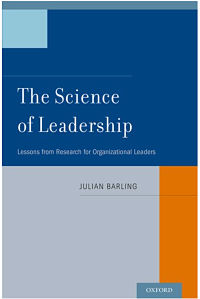The Science of Leadership: Lessons from research for organizational leaders. (2014)

“Takes a middle ground between the academic and practitioner approaches to leadership by outlining practical guidelines that are evidence-based.”
Julian Barling PhD, Queen’s School of Business, Canada.
Oxford University Press, 6 March 2014.
From the review by Prof. Clive Fullagar, Kansas State University:
“The literature on leadership broadly consist of two kinds of book: those that are directed at an academic audience and focus on leadership theory and research, and those that are aimed at practitioners that are non-research based but provide guidelines for the practice of leadership.
“The Science of Leadership, adopts a middle ground by outlining practical guidelines to leaders that are ‘evidence-based’.
“…Barling makes the point that leadership is not confined to people of stature, that it is dispersed throughout all levels of the organisation and that the “best of leadership can be expressed through small but meaningful behaviours enacted at the right time”.
“…Barling also shows that there are few direct links between leadership and organizational success.”
From the publisher’s website:
“A longstanding issue is whether leadership can be taught. Barling explores the debate over whether leadership is ‘born or made’ as well as the effectiveness of leadership development interventions in organizations.
“He gives consideration to what can be learned from leadership in other contexts such as sports, the political arena, and schools, and devotes individual chapters to topics that include gender and leadership, destructive leadership, and followership.”
NOTE: The book includes a section on CEO Hubris (pp. 49-51) and cites Owen & Davidson (2009).
Read the review here: Clive Fullagar’s review
Find the book at the publisher’s website: The Science of Leadership
It is also available on Amazon






Leave a comment
Back to the top